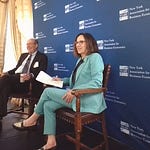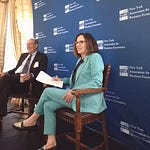Vitor Constancio, former Vice President of the European Central Bank, may not have been in Davos today, but like so many he was glued to the screen as President Donald Trump to spoke at the World Economics Forum. With the ECB meeting next week and widely expected to cut its key rate again, in the past we would have gone right to the question of euro area inflation, weak growth in Germany, concerns over sticky services prices and how many rate cuts are expected this year, and more.
Instead, starting our interview shortly after Trump ended his remarks, we went right to tariffs, why he is threatening to put them on Europe, the damage they would inflict on the euro area economy, and what this could mean for the ECB’s monetary policy path in the months to come.
Vitor also explained why Trump wants to bargain with Europe on tariffs, especially after Trump’s language on Europe was soft, as he said among other things, “I love Europe very much. And why he doesn’t expect euro area governments to retaliate aggressively if the President does put tariffs on them.
Have a look and a listen. If you weren’t in Davos either you will feel as if you were.
Vitor handicaps the tariff objectives and risks 00:01:35:07 - 00:02:16:17
Of course, tariffs across the board to Europe or to other parts of the world, as he has explicitly threatened regarding Mexico and Canada, will affect negatively growth in Europe, which is already weak, as we all know. I think that Europe will not harshly retaliate, depending, of course, on the size of the such tariffs. But the disposition is to try to negotiate and mitigate whatever decision the Trump administration is thinking of applying to Europe. Because everyone knows that the retaliation also is harmful for world trade in general
Vitor pushes back on tariff logic 00:05:24:13 - 00:06:04:04
He fails to grasp that a trade deficit or a balance of payments deficit is also a macroeconomic phenomenon. …the U.S. has a deficit, because it spends more than what it produces. And that's part of the behavior of consumers and of the savings rate of the U.S. as a whole.
Trump is looking to bargain 00:09:31:07 - 00:10:02:21
He wants to bargain. Yes. It's not for nothing that he has not included anything specific in the executive orders or in today's speech. So he wants to bargain with all those countries. The actual words he had today were against Canada… the language regarding Europe was soft, saying, I love Europe very much. He doesn't.
Trump has a plan, we don’t know what it is yet 00:10:02:23 - 00:10:35:17
He said, We are going to have a very good relation ( with China). He said, with Mexico, he said it's already solved. …So, he has something specific regarding Canada that he wants... So, it was very interesting, these different tones of addressing the different parts of world.
Retaliation and risk; Europe in a pickle 00:12:23:12 - 00:12:56:06
I'm sure that, say, China or other parts of the world, if they are subject to significant tariffs, will retaliate. Of course, Europe will retaliate a little bit, but perhaps not too much. But that will aggravate. Of course, that <could be> the beginning of a possible trade war that can go further and further. everyone is worried, I can tell you. But Germany is struggling. Germany has had negative rates in 23 and 20 for two years in a row of negative growth. I think growth in the Euro-Area will be below one <percent>, which is of course very weak. And if tariffs come and then I'm saying without considering U.S. tariffs, if they come, it will be still worse. It depends on the degree of the tariffs, if they are across the board or if they are focused in particular sectors as they were in 2017. Germany will suffer because President Trump is obsessed with German cars exporting a lot to the U.S. Slovak Seabee Governor Peter has been saying he's more <concerned> about the impact on growth < than on inflation>.
Not a fan of the neutral rate concept for policy 00:20:23:23 - 00:21:33:19
As you know, the <European inflation> numbers are well below the US numbers… core inflation or more is still 3.3% in the US. So it's different, but there are indeed some European monetary policy makers that are concerned with the stickiness of the prices of services. Unfortunately there is this discussion, which I totally disagree <with> around the concept of a neutral interest rate and <how far inflation is> outdistanced by the central bank policy rates <compared to> the mythical rate. When interrogated, any central banker that keeps using the concept will say immediately, well, we don't know what is the neutral rate, so why do they keep talking about it if they cannot use it with reliability to really measure the stance of monetary policy? Last December, not long ago, a member of the executive board of the ECB, Mrs. Schnabel, made a speech about this saying, well, we don't know, but the estimates, if we average them, the range of the neutral rate in nominal terms is between 1.5 and 3.5%.
The ECB neutral rate and policy 00:24:11:08 - 00:24:38:02
It would be difficult for them now to go back on that it would be very badly received by markets if indeed they don't do it. But by doing that, they bring down the policy rate to 2.75% from the 3% where it is. So really one more cut and they would be at 2.5% the famous neutral rate according to that speech (the middle of the range)… Christine Lagarde, who is, of course, is the head of the European Central Bank, said her estimate for the neutral rate is 1.75% to 2.5%. Another example of the different very authoritative estimates. Right. Right. And she said that means at least three more 25 basis point cuts now
More US inflation on tap 00:28:29:22 - 00:29:13:13
President Trump may indeed reignite a bit of inflation because it's the budget deficit, which in my view is bound to increase with all the tax cuts and the great difficulty of having significant expenditure cuts. It's the deportation and immigration policy which will create labor shortages and will increase costs of production in several sectors where migrants is very much are very much used.Oil and energy prices 00:32:44:08 - 00:33:23:00
<The importance of the US restarting LNG shipments>… depends on prices. I would say, because until not long ago Europe was importing oil from Qatar and other places in the world, Northern Africa, Africa and other places that were cheaper than importing LNG from the US. If, however, the increase in supply that President Trump policies will induce makes American LNG somewhat cheaper, I'm sure that European imports will increase a lot from the U.S. because also as he remarked, there is another plus, which is the guarantee of supply from, say, a friendly source. So but so far, until very recently, prices and B have been cheaper from other places.
Vitor Constancio
former Vice-President at European Central Bank, Professor at University of Navarra
Advisory Group Member
Website
https://www.iseg.ulisboa.pt/aquila/cursos/emf/vitor-constancio?locale=en
Vítor Constâncio is a professor at the School of Economics & Business Administration of the University of Navarra. From June 2010 to May 2018, he served as Vice-President of the European Central Bank. He was Governor of the Banco de Portugal from 1985 to 1986 and from February 2000 to May 2010. He graduated in Economics from the Universidade Técnica de Lisboa. Before having been appointed as Governor of the Banco de Portugal, he was Executive Director of the Banco Português de Investimento (1995-2000) and Non-Executive Director of the Electricidade de Portugal (EDP), the Portuguese national power utility (1998-2000). He was Invited Senior Professor of Economics at the Instituto Superior de Economia e Gestão from 1989 to June 2010, culminating a long academic career.














Share this post